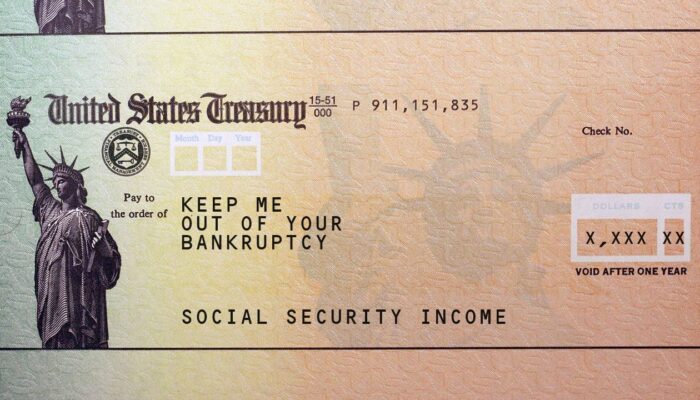Table of Contents
Social Security Income and Bankruptcy: What You Need to Know
Does Social Security income count in a bankruptcy? It may make the difference between a Chapter 7 “straight” bankruptcy where you don’t pay the debt, and Chapter 13, where you do.
In Chapter 7 bankruptcy, income is used to determine whether someone qualifies in two different places. The first is the Form B22, or “means test.” The second is the actual budget. So let’s look at whether Social Security factors in those one at a time.
Social Security Income and the Chapter 7 Means Test
First, let’s look if Social Security income has to be used in the bankruptcy means test for Chapter 7. Remember, the higher someone’s current monthly income is, the greater the chance the income is higher than the median income limit for their state and could create a presumption of abuse.
The good news is that Social Security income is specifically excluded from the Chapter 7 bankruptcy means test and form B22. This is because Congress specifically said in both 11 USC 101(10A) and 42 U.S.C. § 407 at subsection (a) that “…none of the moneys paid or payable or rights existing under this subchapter shall be subject to… the operation of any bankruptcy or insolvency law.”
What is this subchapter? Title 42, Chapter 7 is all about Social Security. This Section 407 is part of a subchapter of that.
There it is: Social Security income is not subject to bankruptcy. While this sounds pretty broad, in practice, courts have generally been very comfortable excluding Social Security income from the means test, but in Chapter 7 not always comfortable keeping it out of the actual budget and a possible surplus.
Social Security Income, Chapter 7, and Actual Budget Surplus (707)
Second, can Social Security income be used if it’s part of the leftover budget of Schedule I minus Schedule J? It seems like the above definition from 42 USC 407 would be pretty clear that Social Security money can’t be used in bankruptcy.
However, some courts struggle to come out and say so. There is a “totality of the circumstances” test in whether someone can get a Chapter 7 bankruptcy discharge. Courts look at all factors, including and especially the monthly income and expenses. This is part of Section 707(b) in primarily consumer debt cases.
Some courts who have said Social Security income is part of the totality of the circumstances test of 707(b)(3) are In re Riggs, 495 BR 704 (Bankr WDVA 2013), In re Booker, 399 B.R. 662, 667 (Bank Ct WDMO 2009) (but see Carpenter, 614 F.3d 930 (8th Cir 2010), In re Meehean, 611 BR 574 (Bankr Ct, EDMI 2020), and In re Calhoun, 396 BR 270, 276 (Bankr Ct SC 2008).
Locally here in the Ninth Circuit, a bankruptcy court has issued an opinion that reviews many factors, including debtors’ ability to repay their debt. The court held:
“In light of the above analysis, this Court is persuaded that Congress intended social security benefits to be protected from inclusion in a § 707(b)(3)(B) analysis, based upon § 407(a) of the Social Security Act and as shown by the Debtors’ social security income being definitively excluded from the means test of § 707(b)(2).”
In re Suttice, 487 BR 245, 254 (Bankr Ct, CDCA 2013).
This isn’t an appellate case, so its finding is not sweeping for all filers in the Ninth Circuit, or even the Central District of California. However, Judge Clarkson’s well-reasoned analysis can certainly be persuasive to other judges.
Social Security Income and Chapter 13 Means Test
Third, what about Chapter 13 and SS income on the B22? Social Security Income is kept out of Chapter 13 and its B22 means test locally here in the 9th Circuit by In re Welsh, 711 F.3d 1120 (9th Cir, 2013), one of the best cases ever. In Welsh, the Ninth Circuit Court of Appeals reviewed “good faith” and the debtors’ refusal to contribute Social Security to their Chapter 13 plan, and said the words of Congress were clear and plain.
Again, Congress specifically excluded Social Security income from being calculated in the means test’s “current monthly income” with 11 USC 101(10A).
The Chapter 13 Form B22C, at Line 10, instructs debtors: “Do not include any benefits received under the Social Security Act…”
The Ninth Circuit noticed that and wrote:
“We thus join every court of appeals that has decided the issue in concluding that, “[w]hen a Chapter 13 debtor calculates his repayment plan payments exactly as the Bankruptcy Code and the Social Security Act allow him to, and thereby excludes [Social Security income], that exclusion cannot constitute a lack of good faith.”
Other circuits holding the same way are:
- 5th Circuit: Beaulieu v. Ragos (In re Ragos), 700 F.3d 220, 227 (5th Cir.2012)
- 6th Circuit: Baud v Carroll, 634 F.3d 327 (2011)
- 8th Circuit: Fink v. Thompson (In re Thompson), 439 B.R. 140, 144 (8th Cir. BAP 2010
- 10th Circuit: Anderson v. Cranmer (In re Cranmer), 697 F.3d 1314, 1319 (10th Cir. 2012)
There may be outlier circuits and bankruptcy courts, but the consensus seems to be to exclude Social Security income from the means test.
Chapter 13, Social Security Income and Totality of the Circumstances
Fourth and finally, much of the rationale and approach of the previous Chapter 13 section applies to the schedules as well. Congress meant what it said when it wrote 42 USC 407. SS income is not subject to bankruptcy law, though debtor can voluntarily choose to use it for feasibility or other purposes. There may be courts who still grapple with this basic concept, but they seem to be few and far between at this point.
In practice, many bankruptcy attorneys in Chapter 13 cases exclude Social Security income from the budget of Schedule I minus Schedule J.¹ The logic is due to 42 USC 407, and as a result, this exclusion usually and correctly goes unchallenged by the trustees.
Generally, SS income stays out of a bankruptcy means test, but there is a split among bankruptcy courts whether it counts in the budget and totality of the circumstances for 707(b) purposes, despite the plain language of Congress that Social Security is not subject to bankruptcy is very clear and unambiguous.
¹ There seem to be many ways how to “not include” SS income on the schedules, while balancing the key tenet of bankruptcy law of full disclosure. Some bankruptcy lawyers will type in a comment about it on the bottom of Schedule I. Other bankruptcy attorneys will include it in Schedule I, and then “back it out” on Schedule J, which isn’t exactly accurate, since the money isn’t truly spent as a lump sum. Another method is to include it as income, then type a note on Schedule I; there may be a surplus, but the trustees know to read everything and understand the law.





